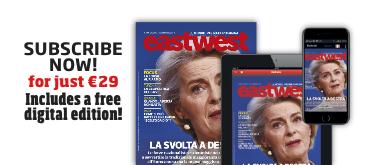
As we did last year, we’ve carried out a survey amongst our readers (in almost 40 countries), asking who among the top ten most influential people of the past year has had the greatest impact on our lives. The respondents have crowned King Vladimir Putin by a broad margin, and thus we have dedicated the cover to him. The portrait is the creation of Alessandra Alma Masi’s tormented irony, the artist who drew a wonderful portrait of Queen Elizabeth II for our Brexit cover, our best-selling issue.
In the English version we have chosen to leave the W in Wladimir (an archaic spelling from German) as a way of enhancing the imperial thrust, so reminiscent of the First Reich. ..and also, perhaps more subconsciously, of a graphic mural inscription hailing the result of our survey: at a time when true leader are at a premium, W Putin!!
A distant second and third came British Prime Minister David Cameron, who called last June’s disastrous referendum, and Turkish President Recep Tayyip Erdogan, in power since 2014, but effectively the country’s overlord for the past decade.
A few considerations on this result:
a) The ‘baddies’ have a greater hold on our collective imaginations than the ‘goodies’, a sentiment that has had a bearing on the outcome of many recent elections in our hamstrung democracies, a situation we analysed more closely in our issue dedicated to psychopolitics;
b) Moreover, our readers/voters seem to believe that leaders less constrained by the wheeling and dealing required to secure democratic consensus are more capable of affecting our everyday lives. Even Mr. Cameron, after all, (negatively) affected our prospects when he tried to employ well-oiled institutional mechanisms by announcing and then engaging in a highly contrived referendum (an institution conceived to allow true democratic participation), tragically presuming he could control its outcome;
c) Even the death of Fidel Castro delivered a similar message. The thousands of people who came out to honour him, in Cuba and beyond, were still awed by the revolutionary energy of his early days in power rather than by the quagmire he has landed the country in during the decades that followed;
d) I don’t think one should only take negative indications from this vote. What it does point to, in my mind, is a frustrated yearning for leadership, which our democracies are having a hard time providing these days. The only ones certain of re-election are the self-effacing leaders like Germany’s Angela Merkel. Meanwhile there are no signs of any visionary or far-sighted leaders on the horizon and how could there be with the average democratic government lasting no more than three years…
A quick word on the solidity of the United States’ democracy as the new president prepares to be sworn in. Hillary Clinton received over two million votes more than Trump overall, but his victory was never questioned (except by a few European commentators, blinded by an incurable superiority complex). That’s how the United States system works. The winner is whoever secures the most electors and not the most votes. And it makes sense: the vote has to be distributed proportionally throughout the states to avoid the more densely populated states from being the only decisive ones. Therefore, anyone winning a state by just one vote is awarded all the electors at stake in that state. Another virtuous aspect of American democracy is that they do not start questioning the rules every time their candidate loses. Titbits of democratic wisdom.
As I write, I am reading the results of the Austrian elections and the referendum in Italy. Van der Bellen is confirmed (after a repeated vote) as Austria’s president for the next six years, dispelling fears that the populist ghoul might overrun the whole of Europe. In Italy, almost 60% of Italians refused to modify the constitution. What they were actually doing was ousting Matteo Renzi; the outgoing prime minister hasn’t managed to dig himself out of the hole he fell into when he attempted to pin his political fortunes to the expected popular landslide vote in his favour (which didn’t pan out as hoped), leading to widespread and dismayed disenchantment.
As we did last year, we’ve carried out a survey amongst our readers (in almost 40 countries), asking who among the top ten most influential people of the past year has had the greatest impact on our lives. The respondents have crowned King Vladimir Putin by a broad margin, and thus we have dedicated the cover to him. The portrait is the creation of Alessandra Alma Masi’s tormented irony, the artist who drew a wonderful portrait of Queen Elizabeth II for our Brexit cover, our best-selling issue.
In the English version we have chosen to leave the W in Wladimir (an archaic spelling from German) as a way of enhancing the imperial thrust, so reminiscent of the First Reich. ..and also, perhaps more subconsciously, of a graphic mural inscription hailing the result of our survey: at a time when true leader are at a premium, W Putin!!







